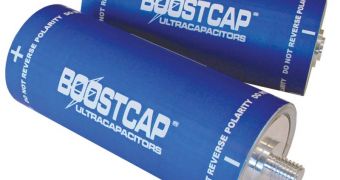About one year ago, the Eestor company hit the news headlines around the world claiming that they had designed a new capacitor capable of storing 2.5 times more electric energy than the traditional Li-ion batteries and would have only a fraction of the weight, volume and manufacturing costs. There is only one problem though: twelve months later, the Eestor company is still failing to provide with a prototype of the elusive ultracapacitor.
Nevertheless, the Lockheed Martin giant seems to know something hidden from the keen eyes of the public, since it managed to strike a deal with the inventor company Eestor. Furthermore, some other companies, such as the car manufacturer Zenn Motor based in Canada, also invested a lot of money in the development of the future device.
Capacitor-like batteries can be used to store electric energy. And the resemblance stops here, as the two have totally different working principles. Batteries store energy converting it through a series of chemical reactions. Reversing the chemical reaction, energy is released. On the other hand, capacitors work storing electric energy in the form of electric charge between two electrodes, with large surface area separated by a dielectric.
At the time of the claim, Eestor argued that the prototype of the device, measuring about 150 kilograms in weight, was able to store a quantity of energy equivalent to about 52 kilowatts of power, in only 5 minutes! Rough calculations revealed that, with the current efficiency of power conversion, an electric car using such a power supply would be able to travel about 800 kilometers before requiring a new recharge.
The ultracapacitor is described by Eestor to be constructed out of barium titanate powder. Traditional capacitors have difficulties in maintaining the power stored inside them, meaning that, over time, they would lose a part of the charge through leaking currents. Eestor claims that it does not have such problems with its new ultracapacitor and would only leak about one percent of the total power, during a month.
Although the original investment of the small electric car manufacturer Zenn, more than one year ago, seemed to be only a strategic act to enhance the Eestor's stock market, the news that Lockheed Martin recently made a deal with the inventor company started to give Eestor more and more credibility and further increased the stocks of both Zenn and Eestor with more than a quarter.
Nevertheless, skeptics are still waiting for a working prototype of the ultracapacitor that would silence them forever. It is still uncertain when this is actually going to happen, or whether Zenn will become the first electric car manufacturer to present a model that has a large autonomy.

 14 DAY TRIAL //
14 DAY TRIAL //